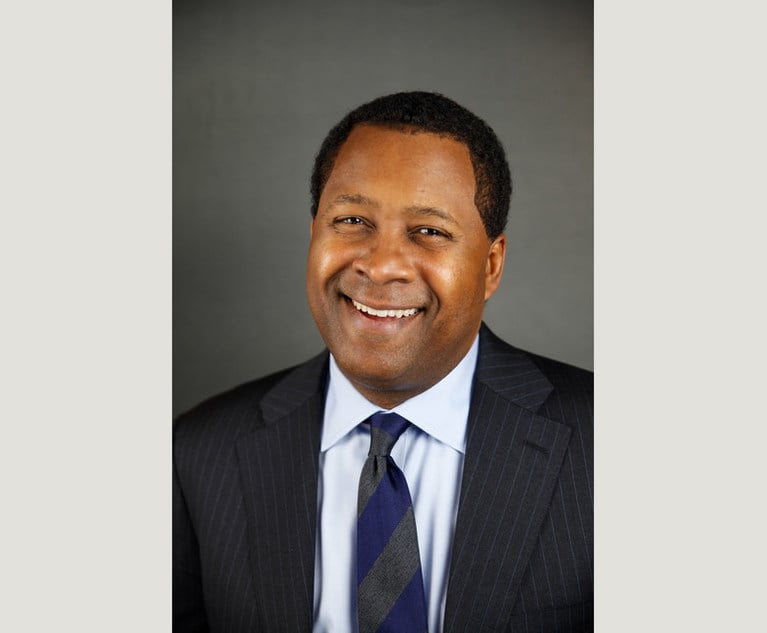Compliance Hot Spots: Covington's James Garland Looks at the Bigger Picture | Trump Vets Cash Out on K Street | 'El Chapo' Prosecutor Joins Mayer Brown | Who Got the Work
Welcome to Compliance Hot Spots, our weekly snapshot of white-collar enforcement, regulatory and news and trends.
July 14, 2020 at 09:00 PM
10 minute read
Good evening, and welcome back to Compliance Hot Spots, our weekly snapshot of white-collar enforcement, regulatory and news and trends. In your inbox this week: Covington's James Garland dishes on white-collar defense in the pandemic. Also: Mayer Brown brings on a top federal prosecutor, DOJ updates the foreign-corruption enforcement guide. Scroll down for Who Got the Work.
Thanks for reading, and we'd love your feedback. Contact C. Ryan Barber in Washington at [email protected] and at 202-828-0315. Follow @cryanbarber.
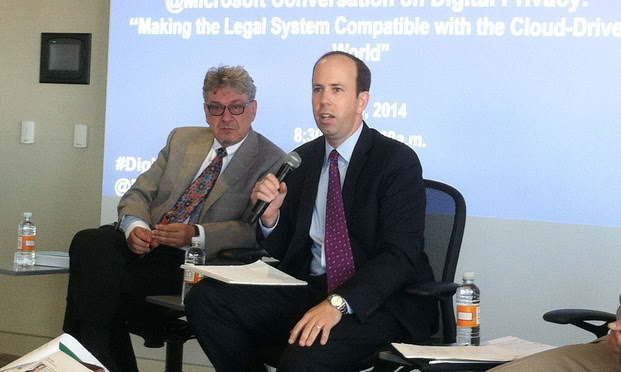
Catching Up With Covington's James Garland on Lawyering in the Virus Era
In the early months of the coronavirus outbreak, Covington & Burling partner James Garland (above) strove to maintain the appearance of an orderly law office in his basement—at least for the purposes of virtual conference calls.
Lately, he has begun to drop the charade. Slowly but surely, the "pandemonium"—the boxes, wrapping paper and "all the stuff that you would see in a basement"—has crept into the frame, he said. The family dog occasionally makes a cameo appearance. "There's definitely a ping pong table in the background of many a conference call," he said. "It is definitely not the finished law library look at the Garland homestead."
In a recent interview, Garland shared insights into navigating the challenges raised by the pandemic. It has been a busy but also delicious time, thanks in no small part to a smoker gifted to him on Father's Day. "It is awesome," said the pitmaster-in-training.
The following Q&A was edited for length and clarity. Check out The National Law Journal on Wednesday for an extended version with commentary on concerns about the politicization of the Justice Department.
It's been four months now since offices in D.C. largely closed down. How have you adjusted to working from home and the "new normal" ushered in by the pandemic?
Garland: Fortunately, our practices have remained busy, even into the pandemic. So we've got a lot of matters still chugging along and, but it's definitely been different kinds of work. Everybody's working remotely now, and that includes both Covington lawyers and also all of our clients, and all of the government. The prosecutors, for the most part, are not going into the office, they're not able to convene grand juries, and the agents are not able to go out and knock on doors and do the things that agents do. So the usual toolkit of both the investigation and prosecution of white-collar cases, and the defense of white-collar cases—all of it has shifted.
What kind of work have you been involved in stemming from alleged covid-19 fraud?
We've seen a lot of activity and outreach from the government for financial institution clients and government contractor clients, not in the nature of investigations of our clients, but from the angle of "if you are detecting fraud through customers, or borrowers whom you're rejecting because you think that loan applications are fraudulent," just for example, "can you tell us or can you let us in on that?" So that's more of a collaborative attitude in the outreach. But we're seeing a lot of that. The kind of covid fraud that I think DOJ is focused on right now is—I'll call it sort of consumer-type fraud. It's not the big-ticket Enron-type investigations, but rather the smaller cases where bad guys are trying to illegally feed from the government trough.
So this is all playing out in an election year. At the beginning of the Trump administration, we spoke about the risk companies perceived in the president's Twitter presence. How have you seen the thinking around crisis management evolve under the Trump presidency?
In January 2017, if Trump tweets about your company, it's a big deal. You convene the board of directors and maybe you issue an 8k, because the president is tweeting about your product or about your decision to move manufacturing or whatever. Now, it's kind of like, 'Whatever, the president's just spouting off again.' It's less significant now because he does it so much.
Having said that, there's a more strategic aspect to the way companies respond to the Trump administration now. There has been a steady stream of fundamental shocks to the systems of international trade and regulation and finance that used to be taken for granted by global corporations. Trump has called so many givens into question. I think companies, in the near term after Trump's election, were really focused on the small-ball of, 'How do we deal with this tweet?', but have evolved their response mechanisms to be more strategic. 'What are we going to do if we're really going to be decoupling our economy from China? What are we going to do if we no longer rely on established policies and practices of the executive branch?' Those are big-picture questions, and they're not born of a single tweet. They're fundamental shifts in government policy and practice that companies are responding to.
SPONSORED BY ALM
Announcing Two Incredible Keynote Speakers for the Women, Influence & Power in Law Conference
WIPL is known for having some of the most engaging and energizing keynote speakers attend to share their thoughts, experiences, war stories and tips on effective leadership. And this year is no exception. This year, we are grateful to welcome two remarkable women come and inspire us: Tina Tchen, the President and CEO of the "Times Up" Legal Defense Fund and Paula Boggs, Founder of Boggs Media LLC and Former Executive Vice President, General Counsel and Secretary, Law and Corporate Affairs at Starbucks from 2002-2012. READ MORE
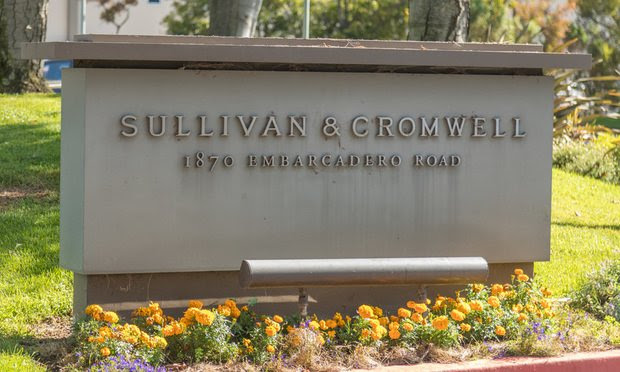
Who Got The Work
>> Sullivan & Cromwell partner Samuel Woodall III in Washington has registered to lobby for The Clearing House Association on "Issues relating to U.S. payments systems." Woodall formerly served as deputy staff director of the Oversight and Investigations Subcommittee of the House Committee on Banking, Finance, and Urban Affairs.
>> Squire Patton Boggs has renewed its advocacy contract with Angola through June 2022, according to new FARA filings at the U.S. Justice Department. The law firm will receive $2.5 million per year, according to the contract.
>> Polsinelli's Rick Levin represented Abra, a California-based app maker, as the firm resolved claims that it offered and sold security-based swaps to retail investors without registration and for failed to transact those swaps on a registered national exchange. The settlement with the Securities and Exchange Commission was related to an app Abra released that allowed users to bet on the price movements of U.S.-based securities. The company did not admit or deny the findings.
>> Hogan Lovells registered to lobby for Nova Southeastern University on "legislative efforts concerning COVID-19 relief for institutions of higher education." The Hogan Lovells team includes Aaron Cutler, a partner at the firm, and senior associate Adam Fridman.
>> Gibson, Dunn & Crutcher registered to lobby on "compensation for victims of 1998 Embassy Bombings in East Africa, according to a new disclosure. The Gibson Dunn team includes Michael Bopp, a partner in the firm's Washington office and former associate director of the White House budget office, and counsel Roscoe Jones.

The Compliance Reading Files
These Are the Deutsche Bank Executives Responsible for Serving Jeffrey Epstein. "Based on descriptions of the employees in the consent order and interviews with current and former Deutsche Bank officials, The New York Times was able to identify nearly every person anonymously described in the order." [NYT] Read the DFS penalty order here.
Consumer Bureau Scraps Restrictions on Payday Loans. "The proposed rules would have been the first significant federal regulations on an industry that makes $30 billion a year in high-interest, short-term loans, often to already struggling borrowers. Those loans can leave borrowers trapped in cycles of debt, incurring fees every few weeks to replenish loans they cannot afford to pay off." [NYT]
Dozens of Trump Veterans Cash Out on K Street Despite 'Drain the Swamp' Vow. "The mass migration to K Street highlights how little effect President Donald Trump's campaign pledge to 'drain the swamp' has had on Washington's revolving door 3½ years into his presidency." [Politico]
Updated Bribery Law Guide Reinforces Broad View of Accounting Provisions. "The latest edition of 'A Resource Guide to the U.S. Foreign Corrupt Practices Act,' released Friday, includes more than 2,600 tweaks in both form and content. It summarizes changes to enforcement policies over the past eight years; lists new partner agencies; provides fresh, anonymized studies of FCPA cases; and updates government practices based on high-profile judicial rulings." [WSJ]
Corporate Compliance Lessons Abound From Navy's Report on the USS Theodore Roosevelt. "For those who have been following the USS Theodore Roosevelt saga for the past several months, they'll know it as a soap opera full of COVID-19, presidential politics, media fascination and intrigue on the high seas. But it's also a terrific teaching moment for general counsel, compliance officers and their governing boards on how best to maintain a culture of transparency and openness within the workforce—not just for compliance purposes, but for challenges of all kinds. For what works for the Navy doesn't always work for the private sector." [Corporate Counsel]
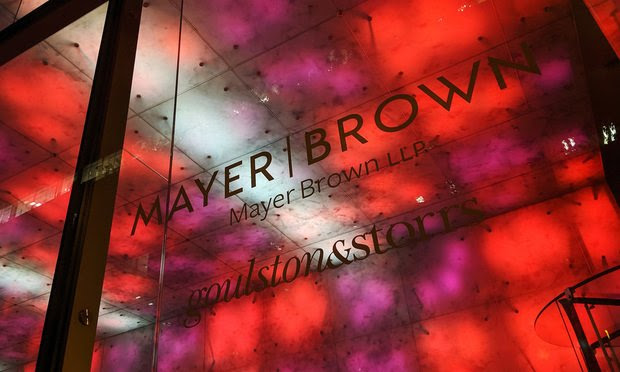
All the Big Moves
>> Mayer Brown said it has hired Gina Parlovecchio as a white-collar defense and compliance partner in New York. Parlovecchio arrives from the U.S. Attorney's Office for the Eastern District of New York, where she had served as chief of the international narcotics and money laundering section. As a prosecutor, she was chief of the U.S. attorney office's international narcotics and money laundering section and lead counsel in the trial of legendary drug kingpin Joaquin "El Chapo" Guzman Loera.
 >> Goodwin Procter has brought on Karen Ubell (at left), a former attorney for the U.S. Securities and Exchange Commission as well as former co-chair of the blockchain technology and tokenization group at Cooley, as a partner in San Francisco. Ubell had been at Cooley for more than four years and prior to that spent the previous six years at the SEC. "Disruption brought on by blockchain technology and digital assets is leading to a multitude of novel legal and regulatory issues," Mitzi Chang, co-chair of the firm's digital currency and blockchain technology practice, said in a statement.
>> Goodwin Procter has brought on Karen Ubell (at left), a former attorney for the U.S. Securities and Exchange Commission as well as former co-chair of the blockchain technology and tokenization group at Cooley, as a partner in San Francisco. Ubell had been at Cooley for more than four years and prior to that spent the previous six years at the SEC. "Disruption brought on by blockchain technology and digital assets is leading to a multitude of novel legal and regulatory issues," Mitzi Chang, co-chair of the firm's digital currency and blockchain technology practice, said in a statement.
>> Cranfill Sumner & Hartzog said it's hired Zac Bolitho, a onetime chief of staff to former Deputy Attorney General Rod Rosenstein, as a counsel in the firm's Raleigh office. Bolitho, who also served as associate deputy attorney general under Rosenstein, plans to represent clients in white-collar criminal investigations and prosecutions.
>> Former Google chief compliance officer Andy Hinton is now advising a start-up for reporting workplace issues, CNBC reported. "He's becoming an advisor to a start-up called #NotMe, which claims to allow employees to make anonymous complaints about workplace issues, including the types of complaints Google has faced in recent years," the report said.
This content has been archived. It is available through our partners, LexisNexis® and Bloomberg Law.
To view this content, please continue to their sites.
Not a Lexis Subscriber?
Subscribe Now
Not a Bloomberg Law Subscriber?
Subscribe Now
NOT FOR REPRINT
© 2025 ALM Global, LLC, All Rights Reserved. Request academic re-use from www.copyright.com. All other uses, submit a request to [email protected]. For more information visit Asset & Logo Licensing.
You Might Like
View All
Compliance Hot Spots: GOP Eyes ESG as an Antitrust Issue + Another DOJ Crypto Seizure + Sidley Partner Jumps to Main Justice
9 minute read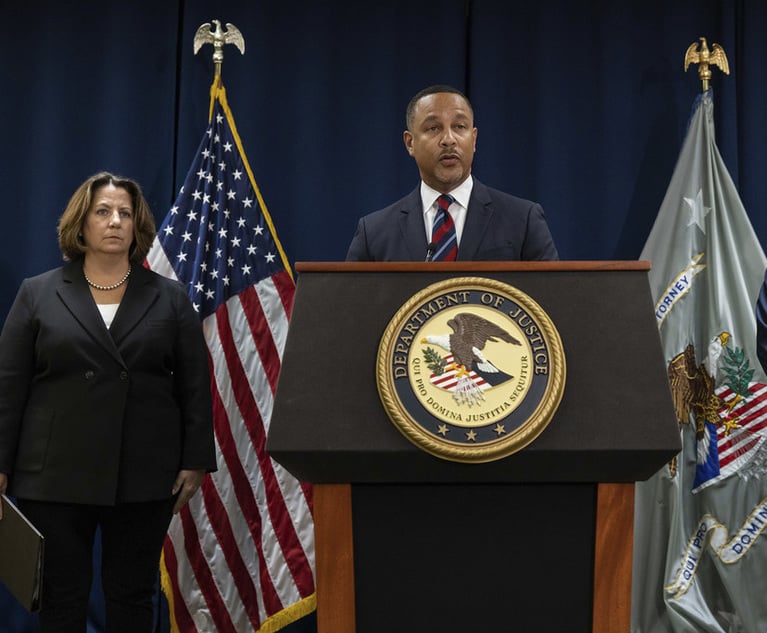
Compliance Hot Spots: Lessons from Lafarge + Fraud Section Chief Talks Compliance + Cravath Lands FTC Commissioner
11 minute readLaw Firms Mentioned
Trending Stories
- 1NJ Jury Awards $4.5M After Woman Trips on Carpet
- 2Blake Lively Is Sued by Texas Crisis Specialist in Latest 'It Ends With Us' Lawsuit
- 3Pa. High Court to Decide Whether Flight in a High Crime Area Can Result in an Investigative Stop
- 4EB-5 Immigration Investor Program: a Win-Win Program, or Is It?
- 5People in the News—Feb. 6, 2025—Unruh Turner, Fox Rothschild
Who Got The Work
J. Brugh Lower of Gibbons has entered an appearance for industrial equipment supplier Devco Corporation in a pending trademark infringement lawsuit. The suit, accusing the defendant of selling knock-off Graco products, was filed Dec. 18 in New Jersey District Court by Rivkin Radler on behalf of Graco Inc. and Graco Minnesota. The case, assigned to U.S. District Judge Zahid N. Quraishi, is 3:24-cv-11294, Graco Inc. et al v. Devco Corporation.
Who Got The Work
Rebecca Maller-Stein and Kent A. Yalowitz of Arnold & Porter Kaye Scholer have entered their appearances for Hanaco Venture Capital and its executives, Lior Prosor and David Frankel, in a pending securities lawsuit. The action, filed on Dec. 24 in New York Southern District Court by Zell, Aron & Co. on behalf of Goldeneye Advisors, accuses the defendants of negligently and fraudulently managing the plaintiff's $1 million investment. The case, assigned to U.S. District Judge Vernon S. Broderick, is 1:24-cv-09918, Goldeneye Advisors, LLC v. Hanaco Venture Capital, Ltd. et al.
Who Got The Work
Attorneys from A&O Shearman has stepped in as defense counsel for Toronto-Dominion Bank and other defendants in a pending securities class action. The suit, filed Dec. 11 in New York Southern District Court by Bleichmar Fonti & Auld, accuses the defendants of concealing the bank's 'pervasive' deficiencies in regards to its compliance with the Bank Secrecy Act and the quality of its anti-money laundering controls. The case, assigned to U.S. District Judge Arun Subramanian, is 1:24-cv-09445, Gonzalez v. The Toronto-Dominion Bank et al.
Who Got The Work
Crown Castle International, a Pennsylvania company providing shared communications infrastructure, has turned to Luke D. Wolf of Gordon Rees Scully Mansukhani to fend off a pending breach-of-contract lawsuit. The court action, filed Nov. 25 in Michigan Eastern District Court by Hooper Hathaway PC on behalf of The Town Residences LLC, accuses Crown Castle of failing to transfer approximately $30,000 in utility payments from T-Mobile in breach of a roof-top lease and assignment agreement. The case, assigned to U.S. District Judge Susan K. Declercq, is 2:24-cv-13131, The Town Residences LLC v. T-Mobile US, Inc. et al.
Who Got The Work
Wilfred P. Coronato and Daniel M. Schwartz of McCarter & English have stepped in as defense counsel to Electrolux Home Products Inc. in a pending product liability lawsuit. The court action, filed Nov. 26 in New York Eastern District Court by Poulos Lopiccolo PC and Nagel Rice LLP on behalf of David Stern, alleges that the defendant's refrigerators’ drawers and shelving repeatedly break and fall apart within months after purchase. The case, assigned to U.S. District Judge Joan M. Azrack, is 2:24-cv-08204, Stern v. Electrolux Home Products, Inc.
Featured Firms
Law Offices of Gary Martin Hays & Associates, P.C.
(470) 294-1674
Law Offices of Mark E. Salomone
(857) 444-6468
Smith & Hassler
(713) 739-1250




